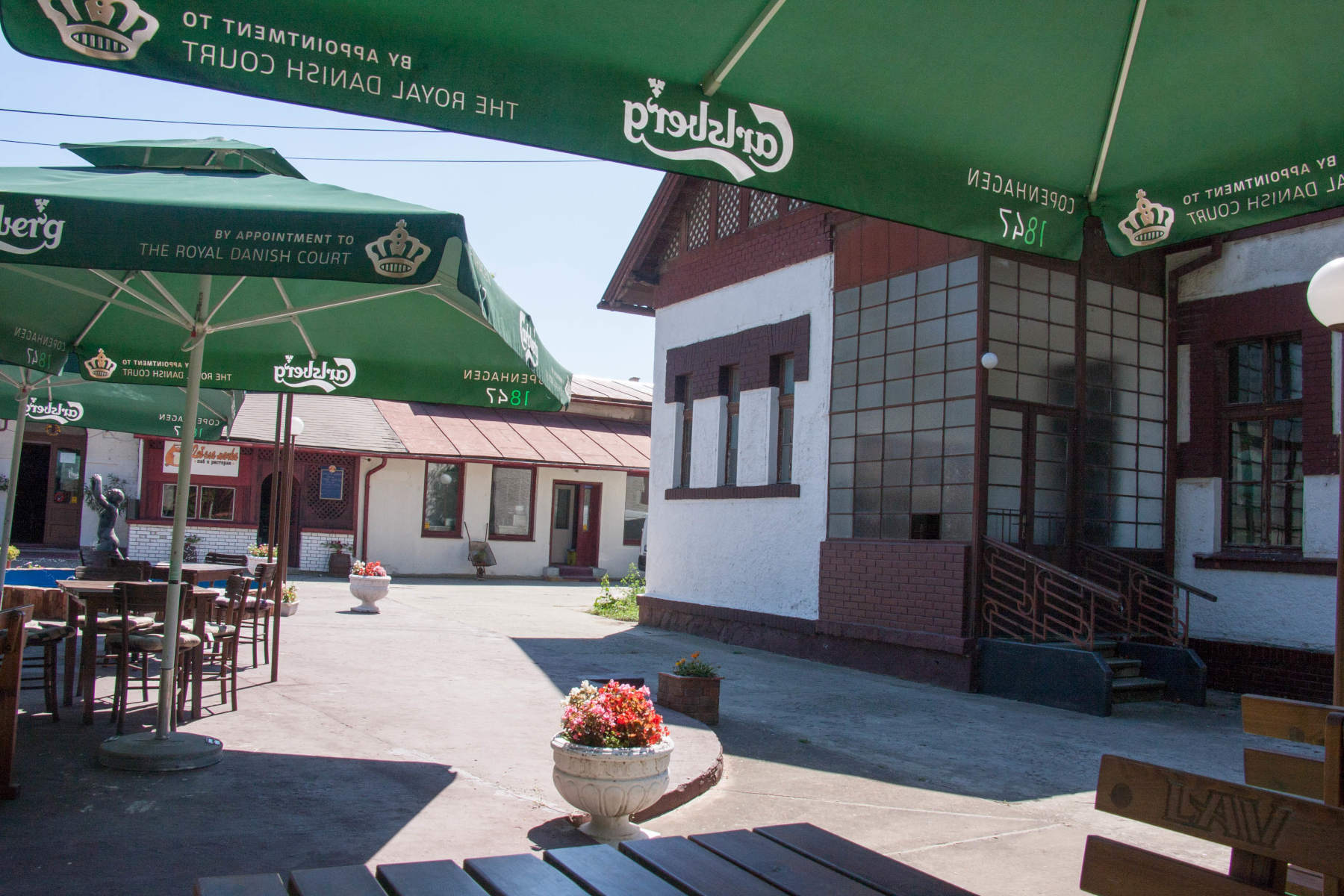Kantina
(Place, tavern, firm, Yugoslavia)
It used to be the military canteen soon after the liberation. Then it was a school, which would later be my elementary school on the other end of the street, once the building was built. Then it was a workers' mess hall, because it was by the main entrance to the sugar factory and the rest of the Kombinat. Dad used to have a ručkonoša (lunch-carrier), four pots which would fit one on another, and then had a rack to hang them and carry arround; for a while he was bringing lunches from there.

How it looked in 2016. The glass entrance led to the library.
Then it would double as a restaurant in the evening, with good barbecue, a stage for the band, a fountain, a separate room called "winter garden" which was sort of posh, with few huge plants and the wall towards the factory set in many windows facing a treeline. The Kombinat had its own horticulture guy, the renowned Vlada parkar*, who was in charge of the greenery and the park across the street and lawns all over the kombinat. My mom was among the youth who planted the park during a radna akcija around 1946, and it was quite funny to them when the brigadier said "you'll bring your children to play here". Guess what - grandchildren too.
In the main building there was a movie and the library, where I got introduced to SF both ways. That's where I saw the first TV set - probably around 1960, peeking into a classroom, and later in the main hall the first juke box and first live music out in the yard. My parents used to bring me there on summer evenings then. In the yard they often left the flatbed cart they used to haul crates from the supply truck into the storage. The wheels were smooth rubber, and the pushside ones swiveled, so I pushed the cart between the tables and learned maneuvering. Entertainment, exercise.
In the seventies, it became a tavern to get drunk in. Few times a year someone would knock the pole at the railway crossing - driving drunk from there he'd just have enough space to accelerate to perhaps 80 kmh. They'd play heavy turbo folk (v. narodnjaci) every evening, and our house was two blocks away. My window was facing away from it, but the sound reflected from the neighbor's wall, so I got into the habit to have my radio on at all times, so I wouldn't hear "Ramo, Ramo, druže moj" four times every night.
There are a few legends from those years, and this one I clearly remember: a bunch of guys take a table for four, but there are seven of them. They order a big plate of ćevapčići and seven forks - there was just about that much space on the table for that and the drinks. They drink, eat, drink, eat, and eventually there's only one ćevap on the plate. They all ogle it but nobody moves, trying to keep up appearances. The waiter watches from his corner, and after a lengthy mexican standoff, turns off the light. Someone screams. He turns the light on, and one of the guys is nursing his palm. The other six had forks in their hands.
In mid eighties we went there with Loba and Magi. They were poor and we weren't rich either, so we'd eat at home and just go there for beers. It was mighty crowded then, the waiter would manage to bring the first four bottles, and the rest of them had to be passed by the others sitting in between - it was so crowded he just couldn't pass. We'd have one final pee in the park, optionally puke, before going home.
In the later eighties, it was the place where you could still have a dinner with your kids. We did that once, but went out to check the place first on a friday, then came back with Go and Nina the next evening. The band was, however, not playing dance music, no Glenn Miller nor Mexican stuff, but turbo folk. Nina asked "why don't they play 'baybe baybe ti nisi tu' (cover of Stones' "baby you're out of time" by Električni Orgazam). Next day was just a mild summer sunday afternoon, and we were just standing in front of the house when one of the waiters passed across the street on his bike, going to work, recognized and waved us. The funny part is that we didn't visit Kantina for about six years before that, and never after that either - and yet we were greeted like regular guests, hey, the waiter knows us :).
Newsflash, june 2016 - after 20+ years someone finally took over and restored the glamour to the place - the Debela mačka moved from the railroad crossing (three blocks away) to here. Which held for about a year. At least she renewed the toilet, put it together with tiles and porcelain. Traditionally, it had a čučavac and the peed-on wall, all brown from it and from the rusty pipe from which water kept oozing. Perhaps the last such one remained in the movie theatre, in the other wing.
See 23-VIII-1955. to understand what this place means to me.
----
* -ar suffix is regular for a person on that kind of job - vaga is a weighing scale, vagar is its operator.
Mentions: 23-VIII-1955., 10-VI-1962., september 1963., august 1964., 16-VI-1966., 25-I-1969., 08-II-1969., 03-IV-1969., 15-I-1971., 22-VIII-1974., 09-VI-1979., september 1985., 30-XII-1994., 26-XI-1999., 03-VIII-2005., september 2005., 13-XII-2010., 28-VIII-2016., 03-I-2017., 18-I-2017., 19-I-2017., 15-VII-2017., 01-VII-2021., 12-VII-2021., 26-IX-2022., 09-IX-2023., 05-V-2024., čučavac, ćevapčići, Debela mačka, Gorana Sredljević (Go), kombinat, Margita Gunaroši (Magi), Milosava Pajdački, narodnjaci, Nevena Sredljević (Nina), radna akcija, Slobodan Šumić (Loba), šećerana, Učubić, Veljko Hlače, in serbian
30-I-2009 - 28-VIII-2025